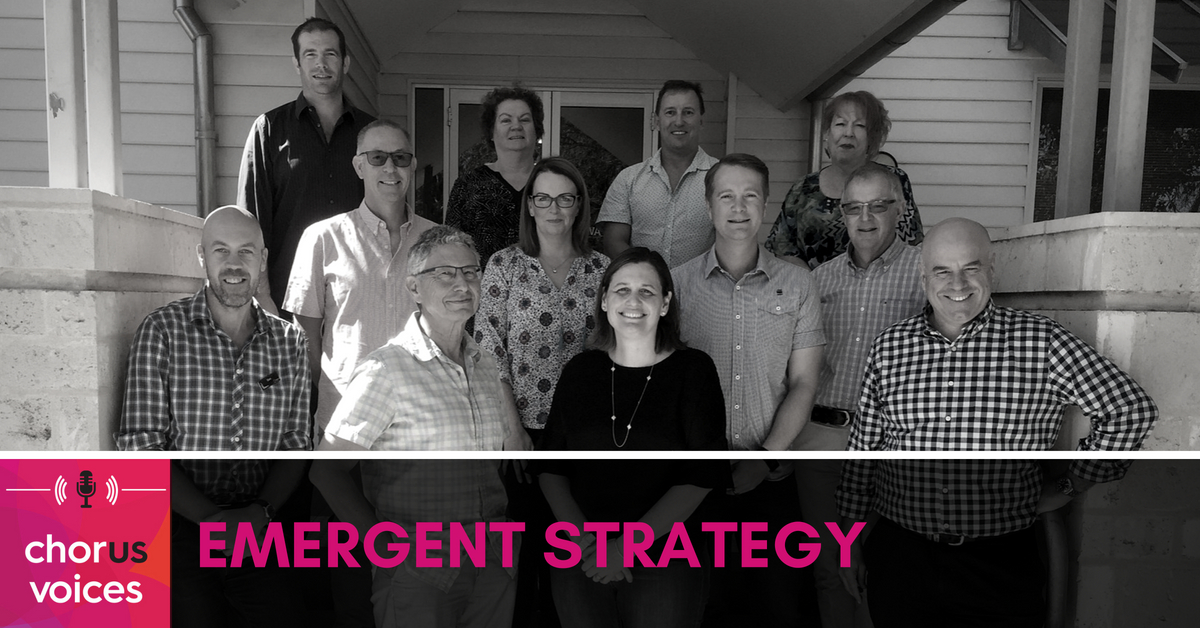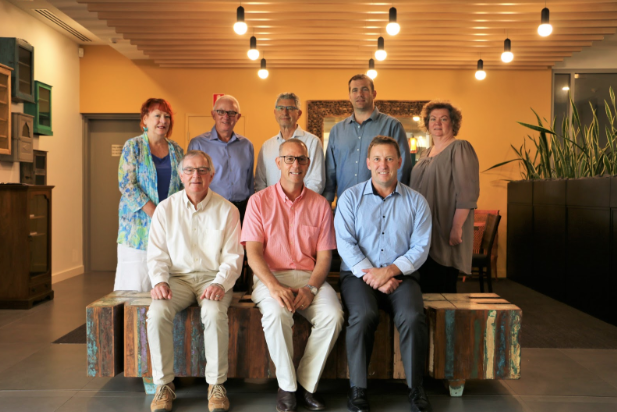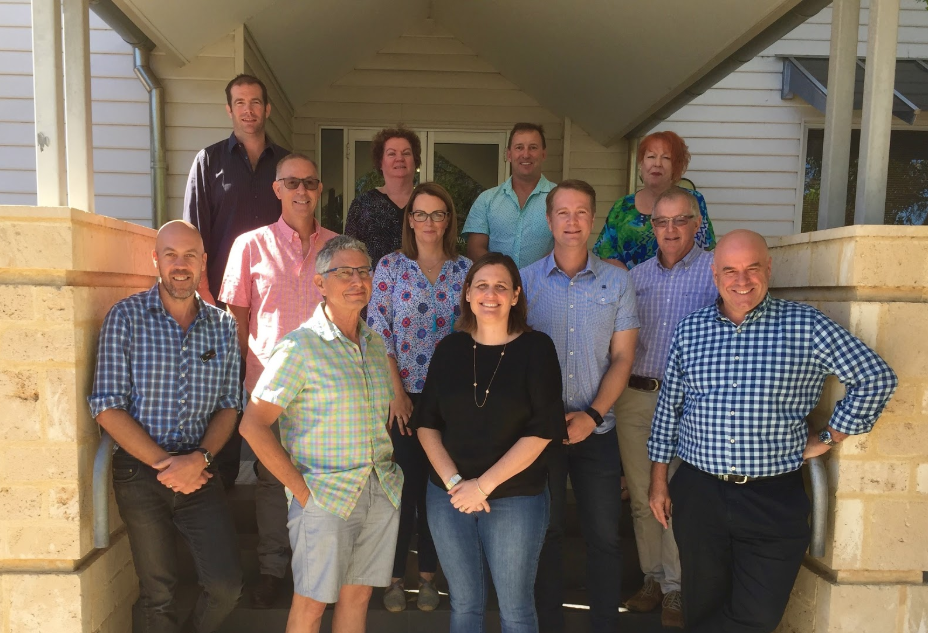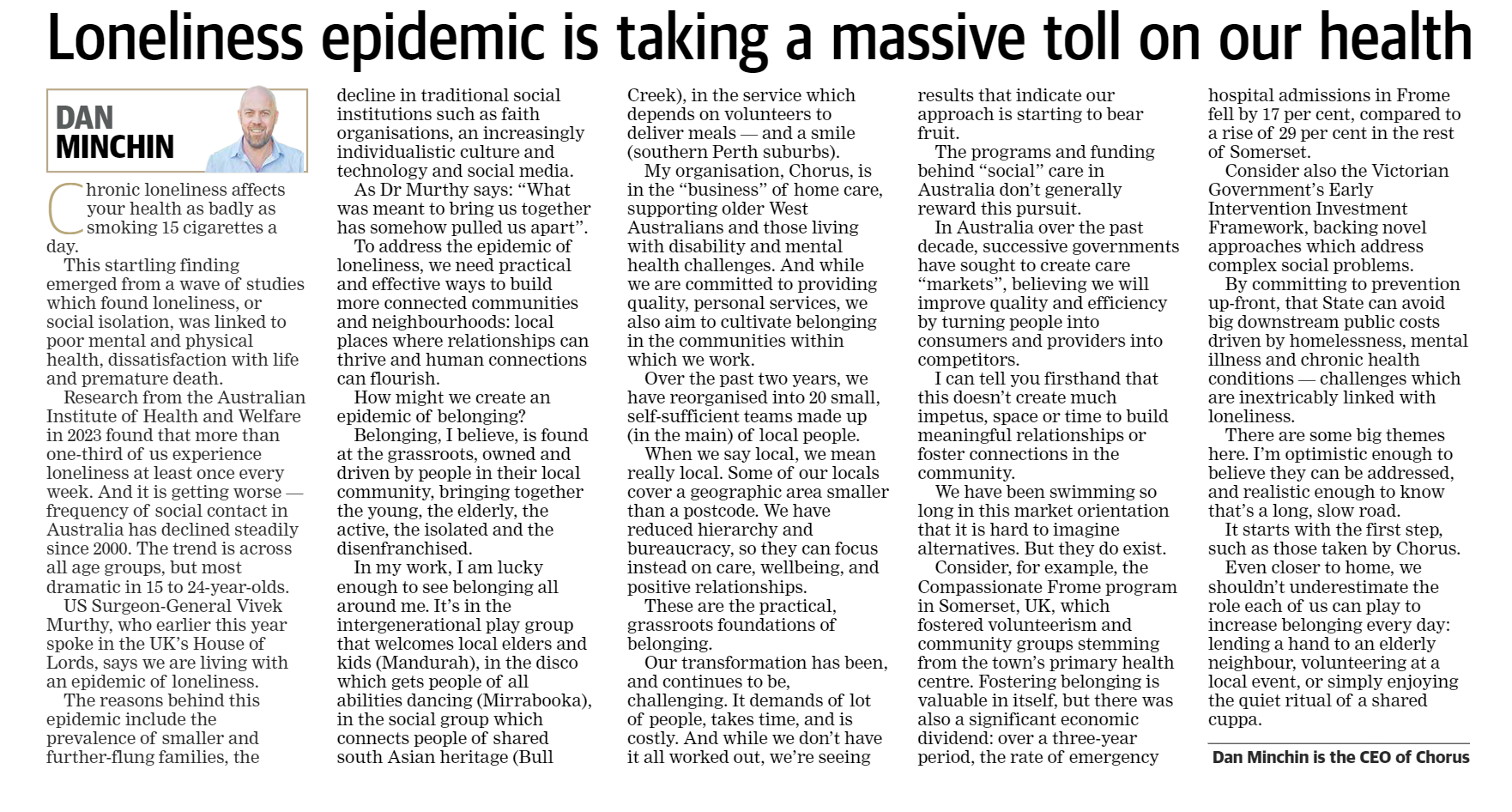
The best strategies are informed by experience, reflection, and aspiration. In episode 13 of Chorus Voices, hosts Dan Minchin and Louise Forster explore how Chorus uses these factors to drive the forward-thinking strategy that has seen the organisation thrive.
Listen Now
Or Listen On: Apple Podcasts | Soundcloud | LibSyn | Spotify | YouTube
Strategy at Chorus – An Organic Approach [0:00]
While organisational strategy is one of the most carefully considered pieces of Chorus, it is also one of the most organic.
Strategy at Chorus has emerged as the organisation evolved. It remains dynamic and open to change through conversation. This week Dan and Louise will take a look at this process: the Chorus strategy, how it’s developed, and how they use it at Chorus to map where they’re going.
The foundation for this strategy was set during the creation phase of Chorus – which was a merger between three different community service organisations.
Prior to the merger, each organisation had its own philosophy and processes. During the merger, leadership took wisdom from each of the organisations, combined it, and committed to update it continually so that it aligned perfectly with both the organisational philosophy, and with the current state of the industry.
At first, Chorus was predominantly a brand, and a set of values. The brand and values then informed strategy and drove organisational change. Who Chorus is, and what Chorus does is simply too important to be set in stone. It must change with the times. It must be flexible. And it must have the capability to shift so that those values and those goals are never hindered by an outdated strategy.
To get some real insight into how this philosophy was born, Dan meets with two members of the Board at Chorus – Chair Moira Watson and Deputy Chair Ray Glickman. Together, they chat about what it was like to create the Chorus strategy in the early days of the organisation.
The Birth of a Modern Service Organisation [4:00]
“There was a lot of fear during this time,” remembers Moira. “We had to literally create this organisation to do the things that we wanted to do.”
In the beginning, all the Board had was an idea of their ideal destination. They knew what the future looked like, but in order to get there, strategy would have to be revisited regularly.
“The strategy happening at Chorus is not about a strategic plan, it’s an emergent strategy, it’s a lived experience. It’s about identifying what it is we’re trying to build and then identifying how we might do that,” Moria explains.
One important goal at Chorus is to become a real part of the communities it serves. Not only does Chorus want to help people and families, it also aims to be an integral piece of that ecosystem. An emergent strategy is part of what helps make this possible, too.
“I see it as a cultural approach. Rather than just the traditional strategic thinking, it’s very much about immersing the organisation within a community,” Moira says.
The Chorus Board has committed to this ongoing process, secure in its unique approach and ability to provide value above and beyond what was expected of care organisations in the past.

Caption: The Chorus Board
Adapting to Change While Making an Impact [14:00]
One of the biggest reasons Chorus employs an emergent strategy is that the entire community service industry is undergoing rapid change.
In order to get some context, Louise meets with leadership and strategy consultant David Blyth, who assisted Chorus in creating its strategic blueprint.
The first thing David remarks on is the change in how funds flow from government to community.
“I didn’t appreciate the extent to which the [community service] sector is transforming with respect to funding,” David explains. “The traditional funding model provided funds directly to the organisation. Now, funding will go straight to the individual consumer, which radically transforms the sector.”
When asked about how the emergent strategy at Chorus performs within this context, David responded thoughtfully:
“It’s interesting to reflect on. You (Louise) don’t appreciate this as an insider, but as an outsider, [an emergent strategy] is a good thing, but an abstraction. But [then], when I got involved with you guys, I started to see its real value. In all this complexity and challenge, we are going to have to find a way to match government funding capacity to the service delivery model.”
This is one of the primary challenges at Chorus, and one that in many ways must be approached with a flexible strategy.
Finally, David recalls that his time with Chorus reminded him of some important fundamentals of strategy: thinking deeply about what you’re trying to accomplish, and having a dynamic strategy.
The Future [18:00]
Through conversation, reflection, and aspiration, Chorus has formed a solid strategic blueprint. From this blueprint, the future of the organisation can flourish with a method tailored to suit its context.
“The board is willing to tolerate that rolling model rather than demanding that we pump out a strategy at the front end. It allowed us the space to build it over time. It’s rare for organisations to do that,” David says.
Strategy may change, but the culture and aspirations Chorus have will always inform how we move forward into the future.

Caption: Chorus Board and Executive Team from 2018
Mentioned in This Episode
Connect With Chorus
Facebook: https://www.facebook.com/chorusaus/
Instagram: https://www.instagram.com/chorusaus/
Twitter: https://twitter.com/chorusaus



